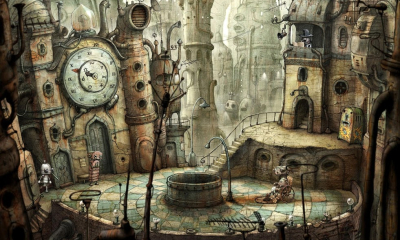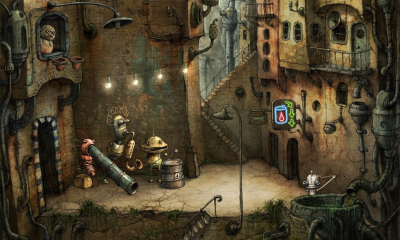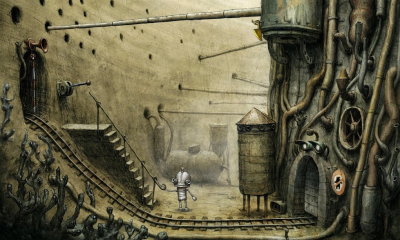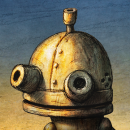Machinarium
The world of video gaming has seen a vibrant array of titles spanning a broad range of genres. From adrenaline-pumping shooters to suspenseful survival horror, there is, quite literally, something for everyone. Occupying a unique space in this vast landscape is a game best described as an artistically rendered interactive poem - Machinarium. Developed by Czech-based studio Amanita Design, Machinarium is a point-and-click adventure game that seamlessly brings together facets of intelligent gameplay, enchanting visuals, and a soundtrack that will linger in your mind long after you've finished playing. Released in 2009, it breaks away from traditional run-and-gun mechanics, delivering an experience that is as intellectually stimulating as it is visually impressive.
An Unforgettable Journey into a Mechanical World
In Machinarium, players step into the shoes of Josef, a small robot on a mission to save his kidnapped girlfriend from the perils of a corrupted robotic city. The narrative unfolds against the backdrop of this beautiful steampunk world, brimming with intricate details that make each level a piece of art.
Unlike other point-and-click adventure games, Machinarium offers no dialogue or written cues. Instead, the game communicates through thought bubbles containing cryptic, animated drawings, contributing to its unique personality. These elaborate hints challenge the players' deduction skills, guiding them through the extensive storyline.
A Testament to Innovation and Creativity
The gameplay of Machinarium is rooted in the rich tradition of point-and-click adventure games, heightening it with a number of innovative tweaks that evoke a blend of nostalgia and novelty. Every scene within the robotic city is meticulously detailed, each harboring an array of interactive components that demand exploration and manipulation to progress in the game.
What sets Machinarium apart is its clever integration of puzzles within the game's environment. Despite the absence of any verbal or textual instruction, the game communicates clues through mini-animations or thought bubbles floating above the characters' heads, making problem-solving a visually organic experience.
One key aspect of the gameplay is an inventory-based puzzle system. Players can collect items scattered across different scenes and use them to overcome obstacles. This collection and utilization of items play a significant role, prompting players to think strategically about what objects might be required to solve future puzzles.
Josef, the protagonist, flaunts some impressive abilities, including the capacity to stretch and shrink his body. This ability adds a layer of complexity to navigating levels and puzzles. For instance, he can shrink to dodge obstacles or stretch to reach high buttons and levers. His attributes ensure a dynamic interaction with the environment, making the gameplay far more immersive.
In some stages of the game, players will be challenged to win a mini-game to proceed, such as a tic-tac-toe match against a robot or a space invader-style shooting sequence. These mini-games add variety to the overall gaming experience while maintaining the intellectual core of Machinarium.
The puzzles in Machinarium are thought-provoking masterpieces, ranging from simple pull-lever actions to more intricate mechanical problems. Some puzzles lean on the classic sliding or pipe-connecting games, while others incorporate musical elements, prompting players to listen and recreate sound sequences. This blend ensures that the gameplay never falls into repetitive or predictable patterns, continuously keeping players on their toes.
In sum, the gameplay in Machinarium offers more than mere entertainment. It invites players on an intelligently designed journey of exploration and problem-solving, all the while capturing their imagination with an atmospheric, beautifully crafted world to traverse.
Weaknesses
Some puzzles can be frustratingly challenging, which would potentially turn off less patient players. The lack of a hint system, while reinforcing the game's attention to cerebral gameplay, might lead to a trial-and-error approach that disruptively breaks the flow of the gaming experience.
A Profound Gaming Experience
Player feedback for Machinarium is overwhelmingly positive. Users laud the game for its beautifully designed world and the immersive aura it exudes, thanks to a harmonious blend of visuals, sound, and gameplay. A commonly shared sentiment is the emotional connection formed with Josef despite him being a speechless robot. Indeed, Machinarium resonates deeply with players on an emotional level, a testament to its success as a storytelling masterpiece. However, the game's difficulty level and occasional slow pacing are drawbacks experienced by some players.
Pros
- Visually compelling with exquisitely designed environments
- Mentally stimulating gameplay featuring unique puzzles
- Engaging storyline presented without dialogue
- Evocative and impressive soundtrack
- Deep emotive connection with the protagonist
Cons
- Some puzzles can be excessively difficult
- Lack of a hint system might frustrate some players
- Gameplay can occasionally feel slow-paced
- Consistent trial-and-error may hinder smooth game flow




























Leave a comment
Your comment is awaiting moderation. We save your draft here
0 Comments